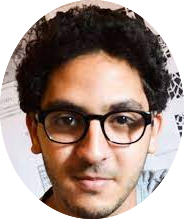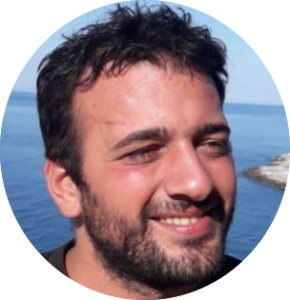Five early-career science journalists have been selected for the 2021 EurekAlert! Fellowships for International Science Reporters. The winners, from China, India, Greece, Egypt, and Brazil, were chosen by an independent panel of judges.
Fellowship winners will receive travel and accommodation support for in-person attendance of a future AAAS Annual Meeting of their choice. The 2022 Meeting will be hybrid, with in-person components held in Philadelphia.
The winners of the 2021 fellowships are:
- Mouttasem Albarodi, freelance, Egypt
- Vishwam Sankaran, The Independent, India
- Panos Tsimboukis, TO VIMA, Greece
- Bruno Vaiano, Superinteressante, Brazil
- Luyi Xu, Caixin Media, China
Special attention toward the impacts science can have on people’s lives emerged as a common thread in the works of this year’s winners. Veteran science journalists serving as judges for the fellowship highlighted the ways science intersects with — and influences — other major facets of society, and why this elevates the need for robust and accessible science journalism at this particular moment in history.
“Scientific research, new technologies, environment and climate change, these aren’t just science stories,” said fellowship judge Milica Momčilović, president of the World Federation of Science Journalists. “They play a major role in key political, economic, cultural and social policy discussions, as well as in public dialogue. Science issues are especially important to cover nowadays.”
Malathy Iyer, senior editor of health coverage for The Times of India who has judged for the program since 2015, cited the tangible benefits of a better scientifically informed populace. In India, for example, relatively simple evidence-based interventions would help reduce dengue and malaria outbreaks, but there is a dearth of public awareness about how people themselves can implement those steps to tamp down the mosquito-borne diseases and the havoc they cause.
“There is a need to inculcate scientific temperament among the people, and regular reporting on scientific facts, discoveries, and developments is much needed in our news publications,” Iyer said. “Science reporting can help spread awareness and act as an instrument of social change that is desperately needed in our country.”
Brazil-based science journalist Roxana Tabakman described the dire need for science journalism in debunking misinformation that threatens social stability. “There was a time when we needed more trained journalists to explain complex information to lay people,” she said. “But now, the underdevelopment of science journalism has broader consequences.”
The 2021 EurekAlert! Fellowship Winners
 Mouttasem Albarodi (@MouttasemA)
Mouttasem Albarodi (@MouttasemA)
Freelance | Egypt
Mouttasem Albarodi is a science writer from Egypt. He started gravitating towards science journalism when he began blogging in his final year of university. After earning his bachelor’s degree in biochemistry, Mouttasem’s blog captured the interest of a senior science editor at a local media outlet, and that was the start of his journalism career. Thereafter, he contributed to several science journalism outlets and initiatives. One of these experiences was as “meme creator” at Popsci Arabia, where he produced memes that communicated complex scientific concepts. Currently, Mouttasem freelances for several science news outlets including Scidev.net MENA edition and Scientific American-Arabic edition where he covers stories on genomic medicine, life sciences, public health, and science policy. He has a longstanding interest in investigative and data journalism. In his free time, Mouttasem’s activities include kayaking in the Nile and cycling.
 Vishwam Sankaran (@Social3uScience)
Vishwam Sankaran (@Social3uScience)
The Independent | India
Vishwam Sankaran is a science and technology reporter based in Chennai, Tamil Nadu, India, and currently writes for The Independent. They found a passion for science news through reading and blogging about research studies as a hobby, which continued throughout their undergraduate program in biotechnology. After participating in several university science events and reading books by other science writers, they realized that their passion lay more in science communication than in lab work. After graduating, Vishwam freelanced for outlets including The Life of Science and The Wire Science, while pursuing a post-graduate diploma in journalism. After a fellowship with the tech media company The Next Web, they began a full-time science reporting job with The Press Trust of India. Vishwam enjoys listening to podcasts, playing video games, and reading. Vishwam is passionate about understanding the latest emerging trends in all fields of science, technology, environment, and health, and how they shape society
 Panos Tsimboukis (@labodenuit)
Panos Tsimboukis (@labodenuit)
TO VIMA | Greece
Panos Tsimboukis has been working as a science journalist with the national Greek newspaper TO VIMA for the last two years, after studying biology and epigenetics. His passion for communicating science led him to pursue, in parallel with his work, a master’s degree in science communication at the University of Grenoble, France. He is also for now part of laboratory i3 of Télécom Paris, Institut Polytechnique de Paris. The lab studies, among others, the public controversies regarding technological innovations and how these innovations are perceived in the public sphere. This work reflects an era where technologies like 5G, facial recognition, and artificial intelligence permeate everyday life.
 Bruno Vaiano (@hungryeyebrows)
Bruno Vaiano (@hungryeyebrows)
Superinterresante | Brazil
Bruno Vaiano is a science writer based in São Paulo, Brazil. He has a degree in journalism from the University of São Paulo (USP) and has worked full-time since 2018 for Superinteressante, Latin America’s highest-circulation popular science magazine – first as a staff writer, then as an editor. There, he does daily online coverage, writes and edits longer features and infographics for the print issues, and oversees the Instagram account. From subatomic particles to black holes, his beats vary in several orders of magnitude. He came first in the Brazilian Institute for Pure and Applied Mathematics (IMPA) 2020 Science Writing Awards. He was a trainee at the newspaper Folha de S. Paulo, the popular science magazine Galileu, and the Vice-Provost’s Office for Research at USP. In his free time, Bruno plays the bass guitar and gets defeated by chess bots.
 Luyi Xu
Luyi Xu
Caixin Media | China
Luyi Xu obtained her bachelor’s degree in economics from Shanghai Jiaotong University in China, and her master’s degree in journalism at the University of British Columbia in Canada. Her reporting interests include astrophysics, life science, and climate change science, as well as applied areas like space telescopes, gene editing, brain-computer interfaces, and the diagnosis and treatment of mental illnesses. Other topics important to Luyi involve academic integrity and a self-correcting science publishing system. Also, with the #MeToo movement’s entrance into Chinese society via its top universities, Luyi also cares about misuse of power and gender equality within the science community.

About the Fellowships
Established in 2004 with a seed grant from the William T. Golden Endowment Fund for Program Innovation and sponsored by EurekAlert!, the AAAS-operated science-news service, the EurekAlert! Fellowships for International Science Reporters support early-career science reporters from emerging economies in the Global South by providing them with opportunities to cover the latest research and network with peers from around the world at AAAS Annual Meetings. Applicants must have five years or less of professional science journalism experience, meet EurekAlert!’s longstanding reporter-registrant eligibility criteria, and submit a complete application including published writing samples, a letter of recommendation, and an original essay.
Past Fellowship winners have represented the Middle East, Africa, Central and South America, India, China, and the Balkan region. For more information about the 2021 Fellowship winners and their Meeting coverage, as well as a list of all EurekAlert! Fellowship recipients since 2004, visit: http://www.eurekalert.org/fellows.
EurekAlert! is a news release distribution platform operated by the nonprofit American Association for the Association of Science (AAAS). The platform, which marks its 25th anniversary this summer, was created to facilitate the sharing and independent reporting of scientific research. Supported by content submission fees and free for working journalists to use, EurekAlert! has served tens of thousands of science journalists, publishers, and research institutions worldwide through its distribution service and other mission-driven programs.